More from Twilight Time
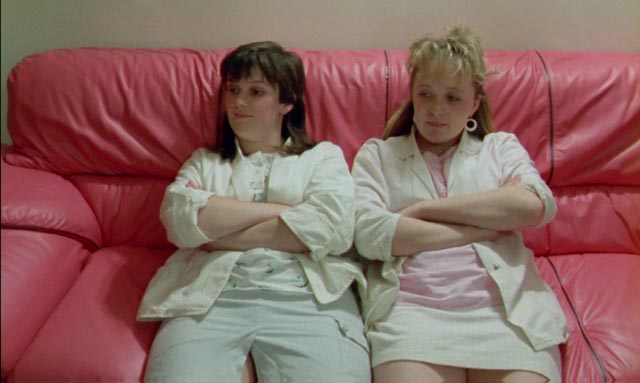
In the past couple of weeks I’ve watched several disks from the eclectic Twilight Time label. While this company originally put out bare bones editions (usually limited to 3000 copies), with their trademark isolated music tracks often being the justification for the selection of titles, they now often include documentaries and commentary tracks – the latter frequently featuring disk producer Nick Redman and essayist Julie Kirgo, who writes the booklet for every release; and occasionally other writers with particular expertise are brought in. These commentaries tend to be lively, conversational, and packed with useful information and strong opinions. Even lesser titles take on interest in this context.
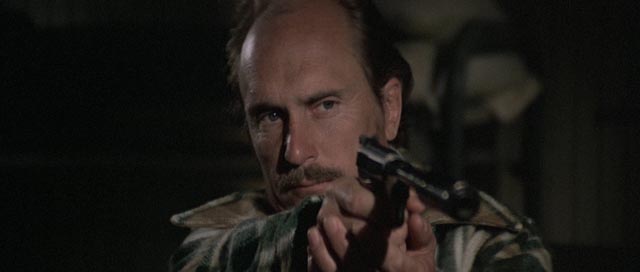
The Killer Elite/Noon Wine (Sam Peckinpah, 1975/1966)
Twilight Time has shown a particular interest in Sam Peckinpah, not too surprising given that Redman produced the Oscar-nominated documentary The Wild Bunch: An Album in Montage. The company has previously put out impressive Blu-rays of Major Dundee and Bring Me the Head of Alfredo Garcia, but their most recent Peckinpah-themed offering seems initially less worthwhile. The Killer Elite (1975) marked the real beginnings of Peckinpah’s decline, coming after the troubled production of Pat Garrett and Billy the Kid and the critically-reviled Alfredo Garcia. By the time of this production, Peckinpah was using cocaine heavily and seemingly losing control of his ability to direct coherently. It didn’t help that the film never had a finished script, with Peckinpah rewriting scenes every day (often in collaboration with co-star Burt Young). Having started the film with no clear idea of what it was about or where the narrative was going, Peckinpah floundered through the shoot and it shows in the almost complete lack of coherence; motivations are never clear and action is staged in often clumsy, even risible, ways. The film becomes an inadvertent parody of ’70s action movies, as nonsensical as Stanley Kramer’s The Domino Principle and seldom exhibiting the directorial passion and skill which marks Peckinpah’s earlier work. And yet the story of this troubled production makes for fascinating listening on the commentary track by Redman with Peckinpah experts Paul Seydor and Garner Simmons.
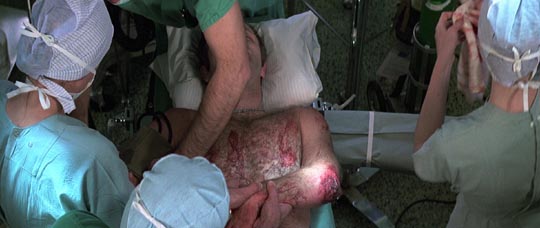
In the past few years, these three, frequently joined by David Weddle, have provided passionate arguments about Peckinpah’s significance as a director; with five commentaries on the Warner Brothers 2006 Legendary Westerns Collection, on Twilight Time’s Major Dundee and Bring Me the Head of Alfredo Garcia, on DVDs of The Getaway, Straw Dogs and The Osterman Weekend, and now on this Blu-ray edition of The Killer Elite, they offer a virtual masterclass in Peckinpah. There are two particular themes they address repeatedly. The first is Peckinpah’s reputation for being “undisciplined” – somewhat rooted in his dislike of producers and insistence on doing things his own way, always a problem for studio people who liked to exert control over directors. As these commentators point out, Peckinpah was actually a highly disciplined director, at least in the initial stages of his career, achieving some remarkable things on what were not particularly big budgets and limited shooting schedules. This was certainly true until the mid-’70s, when he began to substitute copious quantities of cocaine for previously copious quantities of alcohol. After the messy experience of Pat Garrett and Billy the Kid (1973), which saw the film taken away from Peckinpah before he had a chance to complete his cut, following which he retreated to Mexico for Alfredo Garcia, which seems like a determinedly savage finger in the eye of the industry, he ended up taking on The Killer Elite just for the sake of working; following this mess, he recovered somewhat with Cross of Iron (1977) before ending with the twin debacles of Convoy (1978) and The Osterman Weekend (1983), although the latter does have some points of interest.
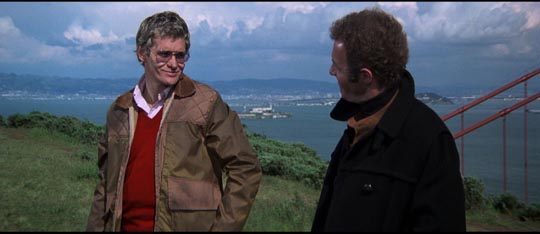
The commentators’ second theme concerns Peckinpah’s use of violence in his films. He had a reputation, based largely on The Wild Bunch, for wallowing in gratuitous gore. At the time, he was breaking some very strong industry taboos – something guaranteed to cause offence. But in his best work, he was clearly concerned about the effects, the consequences of violence; disgusted by the tradition of clean, painless death in the movies, where someone merely fell down when shot, he was determined to show just how awful the effects of violence are, the pain suffered by shattered bodies. Stephen Prince, in his commentary track on Criterion’s edition of Straw Dogs (1971), has an interesting perspective on this issue, pointing out that some of Peckinpah’s nuanced thinking about violence was lost in the westerns because of the sheer force of the genre’s conventions; despite the underlying intention, the self-immolation of the gang at the end of The Wild Bunch takes on a tone of glory, the violence imbued with the heroism of legend. Peckinpah’s themes are far more clear in the contemporary setting of Straw Dogs, perhaps his most deeply misunderstood movie – misunderstood in large part because by the time he made it so many critics were convinced that the director equated masculinity with violence and that he believed that this was a good thing. In Straw Dogs, many viewers simply assumed that the character of David (Dustin Hoffman) was the hero, that the whole point of the film was the transformation of an ineffectual intellectual into a real man through the act of killing. Seen as Prince sees it, David is clearly the villain and the strange glee with which he ends up killing the men attacking his house is a form of madness which irredeemably destroys the social and emotional ties which form the basis of personal relationships (his marriage to Amy [Susan George]) and the community as a whole. The fact that Peckinpah is unflinching in his treatment of the story’s events in no way signifies that he supports David’s actions. If he had supported them, the film would inevitably have ended on a note of triumph instead of the genuinely chilling nihilistic despair which suffuses its final moments.
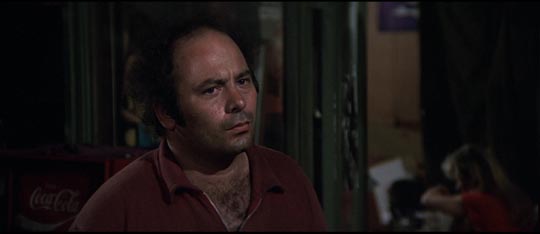
The commentators on The Killer Elite disk struggle to come to terms with what is so evidently a creative collapse in the previously formidable director. The messy, unfinished script and the slackly directed action are a testament to the debilitating effects of Peckinpah’s cocaine habit and the film’s treatment of violence an indication that he no longer had any clear idea of what he was trying to say. The film’s first act is its strongest, set in motion by Robert Duvall’s betrayal of best friend James Caan (a familiar trope in the director’s work which in this case is never coherently followed through); Duvall shoots Caan in the knee and elbow, crippling him rather than killing him (because he values their friendship). This is visceral and disturbing and even now is painful to see. Then comes a lengthy treatment of Caan’s recovery and rehabilitation, emphasizing the fragility of the body and the force of will required to overcome these injuries. All of this ties in with Peckinpah’s previous treatments of the consequences of violence and shows that even here he retained clear traces of his directorial skill. But after Caan recovers, the film drifts vacuously into cartoonish and weightless violence, interminable gunfights in which no one seems to get hurt and finally listless hand-to-hand martial arts combat in which Peckinpah obviously had no interest at all. After that first act, he obviously gave up, barely able to go through the motions.
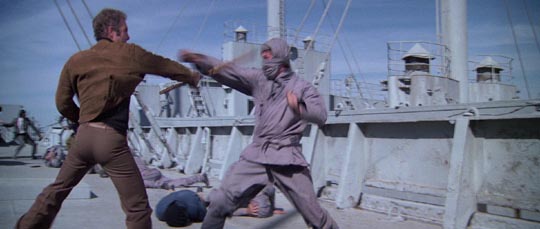
Given all these weaknesses, the real justification for this release is obviously that it gives Twilight Time an opportunity to include on the disk Noon Wine, a one-hour television drama written and directed by Peckinpah in 1966, and the project which helped relaunch his career after the debacle of Major Dundee (which had resulted in his blacklisting for almost two years). The critical reception of Noon Wine opened up an opportunity which the director seized, resulting in his breakthrough with The Wild Bunch.
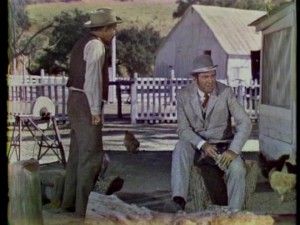
Noon Wine, based on a short novel by Katherine Anne Porter, was made for a short-lived ABC drama anthology series, Stage 67, and according to the commentary (again with Redman, Seydor and Simmons) one reason for its effectiveness is that its milieu (a hard-scrabble Texas farm at the end of the 19th Century) was close to Peckinpah’s own family background; he knew these characters well and imbued them with vibrant life. Lazy farmer Royal Thompson (Jason Robards) prefers going to town for a drink rather than working the land, while his long-suffering wife Ellie (Olivia de Havilland) takes to her bed with neurasthenic headaches while their two young sons enjoy a carefree childhood. When a passing stranger, Olaf Helton (Per Oscarsson), stops by looking for work and willing to sell his labour cheaply, Royal jumps at the chance to pass the chores to him. This mysterious man is quiet, not particularly sociable, but works hard and begins to turn the farm around. But after a year, another man stops by, looking for Helton. Homer Hatch (Theodore Bikel) claims to be a lawman from North Dakota; he claims that Helton is a murderer on the run and is intent on taking him back. There’s a scuffle (Peckinpah keeps the action ambiguous) and Hatch ends up dead, with Royal claiming that he acted in self-defence when Hatch threatened Helton with a knife. Helton himself runs away, only to be cornered and killed by a posse sent after him.
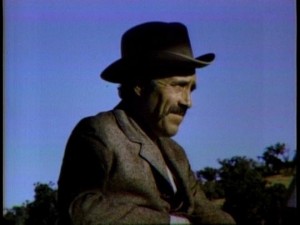
The law, in the person of Sheriff Barbee (Peckinpah favourite Ben Johnson), has little sympathy for Royal, but the farmer convinces his unwilling wife to testify that she saw what happened. It may well be that it was just the way Royal claims, but for Ellie her testimony is nonetheless a lie and she’s tortured by it. Even after Royal is acquitted at trial, the community has no liking for him and he sets out to try to convince everyone individually that he’s innocent, dragging Ellie along on a round of increasingly humiliating encounters. Shattered that no one, not even his own wife, really believes him and plagued by the guilt of knowing that he was indirectly responsible for Helton’s death, Royal can see only one way out. The film ends on a genuinely chilling image of the morally upright Ellie as she hears the gunshot from the barn.
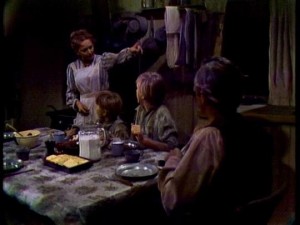
Originally shot on a combination of film (for the location exteriors) and videotape (for the interiors), Noon Wine apparently disappeared after its original airing, with the 2-inch master tape being wiped and reused (a practice common in television back in the day). At some point a poor-quality kinescope turned up (I watched it on-line last year), but in one of those unexpected revelatory moments, a one-inch dupe was discovered in a private collection a couple of years ago. While the quality is inevitably uneven, the colour version restores the film to its significant place in Peckinpah’s filmography. Although shot quickly on a TV budget, the director managed to achieve a cinematic look and drew excellent performances from his cast. Robards’ Royal Thompson is like the dark side of his career topping role in The Ballad of Cable Hogue, made four years later. Although Noon Wine is presented as a supplement to The Killer Elite, it’s the real reason for this particular release to exist.
*
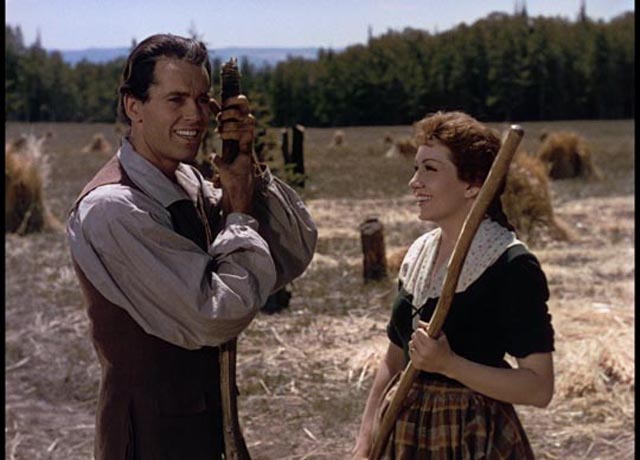
Drums Along the Mohawk (John Ford, 1939)
In some ways, Peckinpah’s western movies were a response to John Ford’s mythologizing of frontier history. I have to confess that I’ve never been a huge Ford fan and even after many viewings I haven’t been able to figure out why The Searchers is so revered (yes, it’s interesting to see John Wayne’s persona turn dark, but it’s always seemed to me that there’s a crucial element missing in his sudden turn from murderous racist to caring protector at the end). Which is not to say that I really dislike Ford’s work, just that I don’t respond to it the way it seems one’s supposed to. One thing Peckinpah shared with Ford (particularly noticeable in The Wild Bunch) is a tendency towards gratingly raucous male bonhomie, often manifested at its worst in Ford’s movies in the drunken rampaging of Victor McLaglen. Thankfully, McLaglen isn’t present in Drums Along the Mohawk (1939), Ford’s first colour feature now given a lush presentation on Blu-ray by Twilight Time.
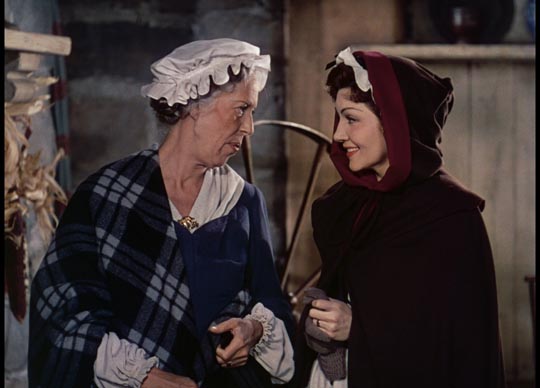
This film reaches farther back into history than the westerns, its setting the Mohawk Valley in New York during the Revolutionary War. Like so much in American pop culture, the movie avoids delving into the politics of that history – surprising since it was, of course, the foundational moment of the nation – preferring to make events a question of character, reducing the conflict to one between nobility and villainy. Drums is best viewed as a character study of frontier life, focusing on a newly married couple – farmer Gil Martin (Henry Fonda) and his bride Lana (Claudette Colbert), the young society woman he brings to the back country from a comfortable city life. The story is really Lana’s, as she grows and adapts and becomes strong and resourceful, and Colbert is excellent in the role as she journeys from fainting hysteria to true grit. It’s this female point of view which sustains interest through the episodic narrative which involves Indian attacks provoked by the dastardly Caldwell (John Carradine) who’s fighting with the strangely unnamed British (the enemies of freedom are merely called “Tories”, perhaps because with the war in Europe just newly started, Hollywood didn’t want to be seen to be beating up on England); and Gil is drafted away into the Revolutionary army, returning wounded from a crucial battle which is not shown, but given vivid presence by the account he gives to Lana in a farmhouse full of broken men.
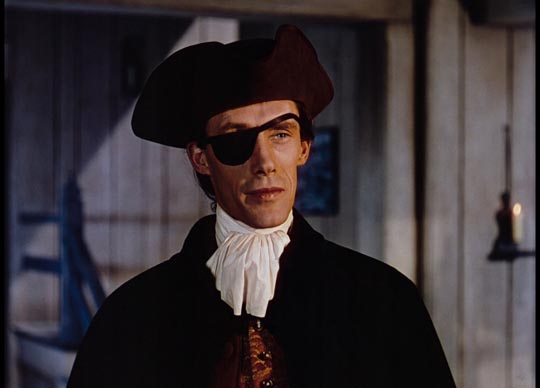
While the rich Technicolor imagery looks wonderful, the best thing in the movie is the lively presence of Edna May Oliver as the widow McKlennar, who takes the couple in when their farm is burned and becomes a surrogate mother. Oliver has impeccable comic timing and the skewed courtship she has with earthy Adam Hartman (Ward Bond) provides a lively counterpoint to the constant threat of violence and death.
Along with a commentary by Redman and Kirgo, the disk includes Redman’s feature-length documentary Becoming John Ford (2007), which focuses on Ford’s long relationship with producer Darryl F. Zanuck at Fox and the ways in which that connection shaped the director’s work and the creative persona we now know.
*
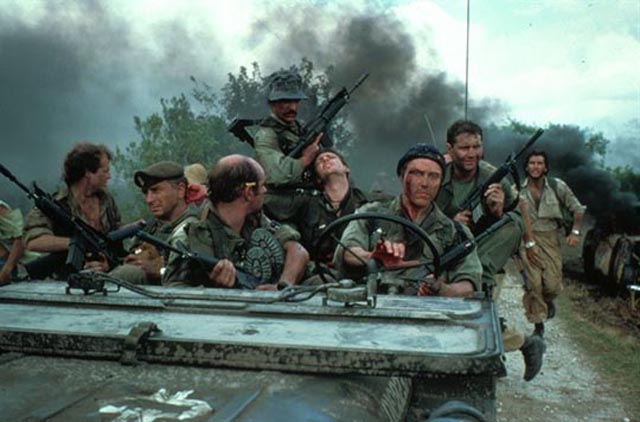
The Dogs of War (John Irvin, 1980)
After a lengthy career in British television which peaked with the classic mini-series adaptation of John Le Carre’s Tinker Tailor Soldier Spy (1979) with Alec Guinness as George Smiley, John Irvin tried his hand at feature filmmaking with this adaptation of a Frederick Forsyth thriller. While it lacks the high concept drive of The Day of the Jackal, The Dogs of War is a fairly interesting story about mercenaries hired by a multinational corporation to overthrow an unpleasant African dictator who is giving them a hard time about mineral rights. Jamie Shannon (Christopher Walken) gathers together a group of his old buddies, puts together the materiel and plans the job, all while dealing with his own troubled life (a failed marriage, loneliness, anger); not surprisingly, he gradually develops a conscience and turns on his employers at the end in an attempt to do the right thing for the oppressed people of the fictional nation of Zangaro.
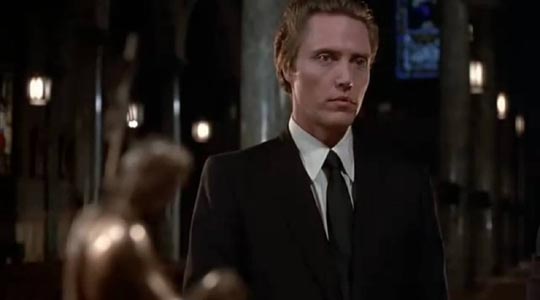
and at war
The performances are generally good – Walken, an Oscar-winner for The Deer Hunter, was just coming off Heaven’s Gate and still developing the persona which has since become so familiar; Tom Berenger is almost unrecognizably young as his second-in-command – and Irvin handles the action scenes efficiently; it’s all nicely shot by the great Jack Cardiff … but in the end there’s little to recommend it above other films of its type. Although Irvin continued to work for the next three decades, there’s little of note in his filmography: he followed Dogs of War with a dismal adaptation of Peter Straub’s massive novel Ghost Story, made a routine action movie with Schwarzenegger (Raw Deal), a routine Vietnam war movie (Hamburger Hill), and so on. His best work came in 1985, far from commercial Hollywood, with Turtle Diary, a fine adaptation of Russell Hoban’s off-kilter romance scripted by Harold Pinter.
No extras on this Blu-ray, although it contains both the original “international” cut and the U.S. theatrical version which was chopped down by fifteen minutes.
*
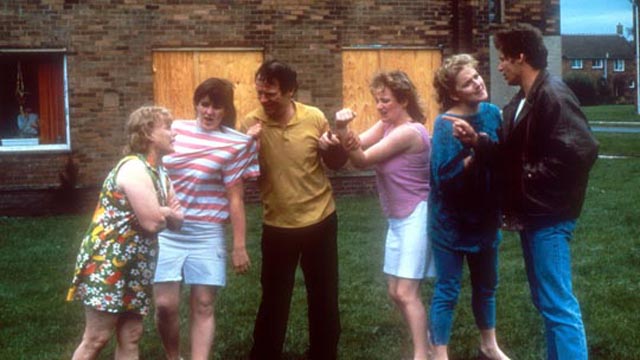
Rita, Sue and Bob Too (Alan Clarke, 1987)
Alan Clarke was one of the most radical and innovative directors on British television in the 1970s and ’80s, creating a remarkable series of dramas in collaboration with some of the best writers of the era – The Firm, Scum, Made in Britain, Contact, the remarkable Penda’s Fen and Elephant (the title of which, along with a watered-down version of its radical style, was “borrowed” by Gus van Sant for his feature about the Columbine shootings). But he only made three theatrical features: a remake of Scum, the original of which had been banned by the BBC; the unique and very odd Billy the Kid and the Green Baize Vampire, a musical about billiards starring Phil Daniels … and Rita, Sue and Bob Too. The latter probably seems even more outrageous by today’s standards than when it was made.
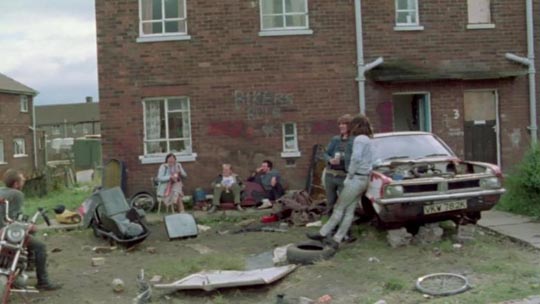
The title and subject matter of Rita, Sue and Bob Too seem to promise a typical Brit sex comedy along the lines of the Confessions series starring Robin Asquith (launched in 1974 with Confessions of a Window Cleaner, probably the nadir of Val Guest’s directorial career), but Clarke’s film turns out to be something else entirely: a socially realistic, devastatingly funny dissection of working class hopelessness in Thatcher’s Britain, centred on sex as entertainment, self-definition, weapon, refuge, and diversion from economic and social despair. Where it becomes troublesome is in its focus on a pair of lively, uninhibited teenage girls.
Rita (Siobhan Finneran) and Sue (Michelle Holmes) live on a grim Yorkshire housing estate, surrounded by the desperate, the unemployed, the feckless and the drunk. In their last year of school, they have nothing to look forward to. So when the rather scummily opportunistic Bob (George Costigan), not very much older than themselves, but living what by comparison is a comfortable middle-class life with his brittle wife Michelle (Lesley Sharp in a terrific debut performance), proposes a bit of fun one evening when driving them home after an evening of babysitting for the couple, the girls enthusiastically agree. From then on, the threesome get out on the moors for a romp whenever the opportunity arises. Yes, Bob is “taking advantage” of the underage pair … but in fact, the two friends are using him as an outlet, a source of entertainment, and in a strange way, as a means of strengthening their friendship.
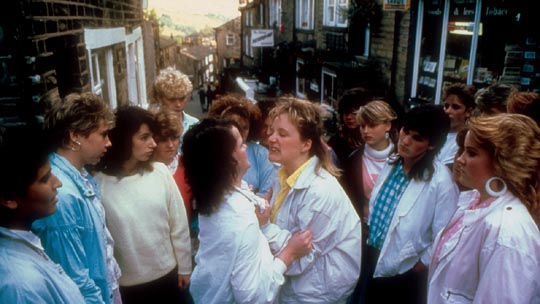
Fault lines appear when it turns out that Rita has been seeing Bob on the side, and the situation explodes when Michelle realizes what’s been going on and creates a very public scene which ends with her leaving Bob – and Rita moving in with him. But friendship is ultimately stronger than sex and in the end the two girls combine forces and take over Bob’s life, the supposed predator now serving their needs (a switch in power positions which threatens his ability to perform).
Rita, Sue and Bob Too was written by Andrea Dunbar, who had actually grown up and lived on the estate in Bradford where the film is set (and was shot). The script was based on a pair of plays she wrote in her teens, which were performed at London’s esteemed Royal Court Theatre. The connections between Rita, Sue and Dunbar are very clear and the depiction of life on the estate so brutally honest that the writer actually received threats from her neighbours, though she continued to live there, having three children by different fathers before her death at 29 as a result of alcoholism. In other words, the comedic, empowering depiction of the two girls in the film stands as an optimistic (to a degree) counterpoint to the hopeless reality of life in Thatcher’s shattered England. The sex is depicted honestly, naturalistically, without sentiment or moral censure, as one of the very few positive outlets available to these girls, and as such offers a nuanced problem for stark attitudes which define sexuality in rigid terms, particularly pre-adult sexuality. The film’s exuberant humour stands as the only real defence against the hopelessness of lives with nowhere to go.
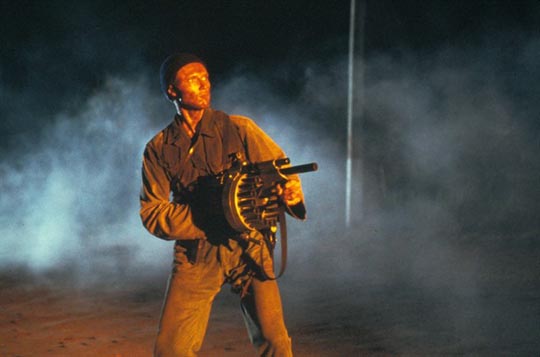
Comments